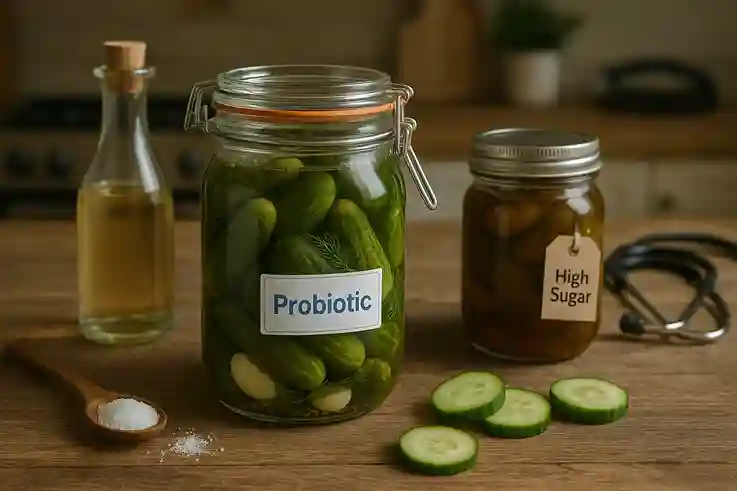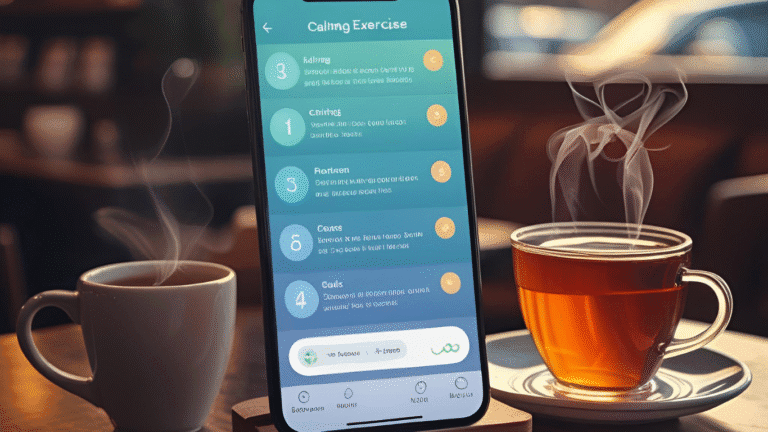Are Pickles Good for You
Are pickles good for you? It’s a question more people are asking as pickles surge in popularity—from viral snack trends on TikTok to claims about gut health and post-workout hydration. These briny, crunchy vegetables are no longer just sandwich sides—they’re now starring in protein bowls, juice shots, and wellness routines.
But beneath the bold flavor and crave able crunch lies a more complex nutritional story. In this science-backed guide, we’ll examine what’s really inside your pickle jar—fermented vs. vinegar pickles, the role of probiotics, hidden sodium, and surprising health impacts. Let’s explore whether pickles deserve a regular place in your diet—or just the occasional bite.
What Counts as a Pickle?
The term “pickle” might sound simple, but it actually refers to a wide range of preserved vegetables—most commonly cucumbers—that have been soaked in either vinegar or brine. Pickling is one of the oldest food preservation methods, but not all pickles are created the same nutritionally.
At the core, there are two major ways cucumbers become pickles:
- Vinegar pickles: Soaked in a vinegar solution, often heated or pasteurized
- Fermented pickles: Preserved in saltwater (brine) and left to ferment naturally over time
Different pickle styles fall under these categories:
- Dill pickles: Classic, usually made with vinegar, garlic, and dill weed
- Sweet pickles: Vinegar-based and loaded with added sugar or syrup
- Bread & butter pickles: A sweet-sour version flavored with onions and spices
- Fermented pickles: Brined without vinegar, often raw and rich in probiotics (e.g., traditional kosher dills, kimchi, or Korean-style pickles)
Each type brings a distinct taste and health profile. For example, fermented pickles may boost gut health thanks to beneficial bacteria. Vinegar pickles, while tasty, are often pasteurized and lack those live cultures. And sweet pickles can contain surprisingly high amounts of sugar.
Bottom line: Whether a pickle is healthy or not depends on how it’s made. The same crunchy bite could be probiotic-rich—or just salty and sweet.
Are Pickles Good for You? Nutrients That Matter
Are pickles good for you? When it comes to nutrients, they may offer more than just flavor. Pickles—especially when made with minimal processing—can contain small but significant amounts of beneficial compounds.
One of the standout nutrients in most cucumber-based pickles is vitamin K, which plays a key role in blood clotting and bone health. Just a few pickle slices can provide a meaningful portion of your daily vitamin K intake, particularly if the skins are left on.
Pickles also contain electrolytes, most notably sodium and potassium. Sodium is naturally present in all pickles due to the brining process, which helps preserve the food and enhance taste. While high sodium intake can be a concern, small servings can help replenish electrolytes after intense workouts—one reason athletes sometimes drink pickle juice to relieve cramps.
Potassium, although present in lower amounts than sodium, supports heart and muscle function. The balance between sodium and potassium intake is essential, especially for people managing blood pressure.
Pickles made with natural ingredients like garlic, dill, mustard seed, and peppercorns may also offer antioxidants. These compounds help neutralize free radicals and support cellular health, though the exact levels vary based on preparation and storage.
One thing to note: pickles preserved in vinegar may influence blood sugar levels. While vinegar has been shown in some studies to reduce post-meal glycemic spikes, sweet pickles or those with added sugar could counteract this benefit. Always check for sugar content if you’re managing glucose levels.
In short, pickles provide small doses of key nutrients—but their health impact depends on portion size and how they’re made.
Do Pickles Help Gut Health?
Pickles are often linked to digestive health—but not all pickles support your gut in the same way. The key factor is fermentation.
Fermented pickles, made by submerging vegetables in saltwater (brine), allow naturally occurring bacteria to break down sugars over time. This slow process produces probiotic strains like Lactobacillus plantarum and Lactobacillus brevis, which may help balance gut flora, support immune function, and improve digestion.
For pickles to benefit your microbiome, they must be:
- Fermented (not just vinegar-pickled)
- Raw and unpasteurized, to retain live probiotic cultures
Many store-bought pickles are vinegar-based and then heat-treated for shelf stability. Pasteurization kills the beneficial bacteria. These products may taste similar but offer no probiotic benefit.
Even among fermented pickles, not all are labeled clearly. Look for refrigerated jars marked “raw,” “naturally fermented,” or “contains live cultures.”
Kimchi and traditional kosher dills often fall into this category—especially if they’re artisan or homemade.
Summary: Fermented, unpasteurized pickles can support gut health through probiotics. Vinegar pickles, while tasty, typically offer no digestive benefit.
Sodium in Pickles: The Health Risk You Can’t Ignore
Pickles are undeniably flavorful—but that signature salty bite comes at a cost. Most pickles contain between 500 and 1000 milligrams of sodium per serving, often from the brining or fermenting solution used to preserve them.
Why High Sodium Matters
Sodium is an essential electrolyte, but excess intake can have serious health consequences. Research consistently links high sodium consumption to increased risk of:
- Hypertension (high blood pressure)
- Water retention and bloating
- Kidney stress and fluid imbalance
These effects are more pronounced in people with existing health conditions such as:
- Chronic kidney disease (CKD)
- High blood pressure or heart failure
- Sodium-sensitive migraines
How Much Sodium Is Too Much?
According to current guidelines from U.S. health authorities:
- The recommended daily sodium limit is 2,300 mg for healthy adults
- Many experts advise no more than 1,500 mg/day for people with hypertension or kidney issues
With just one large dill pickle containing up to 800 mg, a single snack could account for over one-third of the daily maximum.
The Bottom Line on Sodium in Pickles
While an occasional pickle won’t harm most people, regular or excessive intake—especially from multiple servings per day—can add up quickly. Always check serving sizes, and opt for low-sodium or fermented varieties when possible.
Sweet Pickles and Sugar: Hidden in the Brine
Pickles are often thought of as a salty snack, but sweet varieties can contain more sugar than most people realize. Both sweet pickles and bread & butter pickles commonly contain between 5 to 10 grams of sugar per serving. This added sugar, often masked by the tangy brine, can significantly change the nutritional impact of what might otherwise seem like a low-calorie food.
Added sugars raise specific concerns for individuals with diabetes, insulin resistance, or those trying to manage blood sugar levels. Although a small serving may seem harmless, the sugar in these pickles can lead to post-meal glucose spikes and reduce the metabolic benefits often associated with fermented or savory pickle options.
Many commercial pickle products rely on sweetening agents like cane sugar, corn syrup, or high-fructose corn syrup. These ingredients not only increase the sugar content but also contribute to overall carbohydrate intake. Because of this, it’s essential to read the nutrition label carefully. Look for products that list “added sugars” separately and examine the ingredients list for common sweeteners.
For those watching their sugar intake, choosing dill or naturally fermented pickles without added sweeteners is a better option. Homemade pickles or refrigerated raw varieties typically offer more control over ingredients and fewer unnecessary additives.
In short, sweet pickles may satisfy your craving, but they’re not ideal for those trying to manage blood sugar or reduce processed sugar consumption. Always check the label before reaching for that crunchy bite.
Do Pickles Help with Weight Loss?
Are pickles good for you when trying to lose weight? The answer depends on the type and how they’re made. Pickles are naturally low in calories—typically under 10 calories per spear—making them an appealing option for those watching their energy intake. Their intense flavor may also help curb cravings and support portion control, especially in savory snacks.
However, the story is more complex. While dill or fermented varieties can complement a weight-loss-friendly diet, pickles high in sodium or added sugars may work against those goals. Sweet pickles and bread & butter varieties, in particular, can contain up to 10 grams of sugar per serving, which contributes to excess calorie intake without providing lasting satiety.
Excess sodium is another concern. Pickles preserved in brine or vinegar often contain 500–1000 mg of sodium per serving. This can lead to water retention, which may mask fat loss and contribute to bloating or elevated blood pressure—particularly in salt-sensitive individuals.
For those seeking to use pickles as part of a weight management strategy, the best options are unsweetened vinegar pickles or raw, fermented types like traditional brined cucumbers or kimchi-style vegetables. These provide the flavor boost without the metabolic drawbacks of sugar and excessive sodium.
In summary, pickles can be helpful for weight loss when chosen wisely. They should enhance a balanced diet, not undermine it with hidden ingredients.
Are Pickles Better Than Fresh Cucumbers or Other Fermented Foods?
| Nutrient / Property | Fresh Cucumber | Vinegar Pickle | Fermented Pickle | Kimchi |
|---|---|---|---|---|
| Calories | Very low | Low | Low | Medium |
| Sodium | Very low | High | Medium–High | High |
| Probiotics | None | None | Yes (unpasteurized) | Yes |
| Vitamin K | Moderate | High | High | Moderate |
| Antioxidants | Some | Preserved | Present | High |
| Sugar (added) | None | Possible | Unlikely | Sometimes |
Busting Common Myths About Pickles
Myth 1: Pickles Are Always Healthy
Not all pickles are created equal. While fermented varieties can offer benefits, many store-bought pickles are packed with sodium and added sugar. Excessive intake may raise blood pressure or impact blood sugar regulation. Nutrition depends heavily on the type and preparation method.
Myth 2: All Pickles Have Probiotics
Only fermented, raw, and unpasteurized pickles provide live beneficial bacteria like Lactobacillus plantarum. Most vinegar-based pickles—especially those that are shelf-stable—are heat-processed. This kills any potential probiotic strains and removes their gut-health benefits.
Myth 3: Pickle Juice Is a Cure-All
Pickle juice contains sodium and small amounts of potassium, which may support hydration in athletes during intense activity. However, there’s no strong evidence that it treats cramps, dehydration, or other conditions broadly. It’s helpful in some contexts—not a miracle remedy.
Myth 4: Pickles Help Hangovers
Pickles might help replenish electrolytes lost through alcohol, especially sodium. But there’s little clinical proof that they relieve hangover symptoms. While they may offer mild support, they are not a substitute for hydration, rest, and proper nutrition.
Pickle Juice: Hydration or Hype?
Pickle juice is often praised by athletes for its electrolyte content and cramp-fighting potential. The idea is that its high sodium concentration can help replace electrolytes lost through sweat, especially during intense exercise or heat exposure.
Some studies have explored the effect of acetic acid, the main component in vinegar-based pickle juice, on muscle cramps. Results suggest that it may trigger a neurological reflex that reduces cramp duration. However, the exact mechanism is still debated, and more research is needed to confirm its effectiveness.
Despite the hype, pickle juice isn’t a universal solution. The acidity can irritate the stomach lining in sensitive individuals. Over time, it may also erode tooth enamel if consumed frequently. It might help in specific athletic scenarios, but it’s no substitute for water, balanced nutrition, and medical guidance when needed.
Who Should Limit Pickle Intake?
Pickles may not be suitable for everyone, especially those with underlying health concerns. Their sodium content, acidity, and sometimes added sugar can pose risks when consumed in excess.
High Blood Pressure
People with hypertension should monitor their pickle intake closely due to the high sodium content commonly found in preserved foods. A single serving of pickles—just one medium spear or a few slices—can contain between 500 and 1000 milligrams of sodium. That’s up to 40% of the recommended daily limit set by health organizations, which is 2300 mg for most adults and 1500 mg for those with high blood pressure.
Excess sodium in the diet causes the body to retain water, which increases the volume of blood in the vessels. This added pressure forces the heart to work harder and elevates blood pressure levels. Over time, consistently high sodium intake is linked to an increased risk of stroke, heart attack, and kidney damage.
For individuals already managing hypertension, even small dietary slip-ups can hinder blood pressure control. Pickles, though small in size, can be a significant hidden source of salt. It’s important for people in this group to read labels carefully, watch portion sizes, and consider low-sodium or homemade pickle options if they choose to include them in their diets.
Kidney Conditions
Individuals with compromised kidney function—such as those with chronic kidney disease (CKD)—must limit their intake of high-sodium foods, including pickles. When kidney function declines, the body loses its ability to effectively regulate sodium and fluid balance. Even moderate sodium excess can lead to fluid retention, elevated blood pressure, and increased workload on already stressed kidneys.
Excessive sodium causes the body to retain water, which can contribute to swelling (edema), shortness of breath, and a higher risk of cardiovascular events. In people with kidney impairment, this fluid buildup can be particularly dangerous, increasing the risk of heart failure or accelerating kidney damage.
Many pickles contain 500–1000 mg of sodium per serving, which can quickly add up and exceed recommended limits. For individuals with CKD, sodium intake is often restricted to 1500–2000 mg per day—meaning one serving of pickles could account for half or more of that daily allowance. For these individuals, avoiding pickles or choosing no-salt-added versions may be necessary to support kidney health and prevent complications.
Acid Reflux or Ulcers
The vinegar and acidity in many pickles can irritate the stomach lining, especially in people with gastrointestinal conditions. Individuals prone to acid reflux (GERD), gastritis, or peptic ulcers may find that pickles worsen their symptoms. The acetic acid in vinegar stimulates gastric acid production, which can increase the likelihood of heartburn, stomach discomfort, and acid regurgitation.
Fermented pickles may also contain organic acids that, while beneficial for gut bacteria, can be harsh on sensitive digestive systems. In cases of gastritis or ulcers, acidic foods like pickles may delay healing and contribute to inflammation.
For people with these conditions, it’s advisable to limit or avoid acidic foods—including traditional vinegar-based or fermented pickles—to help maintain comfort and support digestive recovery. Low-acid alternatives or bland, non-fermented vegetables may be better tolerated.
Sodium-Sensitive Migraines
For some individuals, migraines can be triggered by dietary factors—especially high-sodium foods. Pickles, though small in portion, often contain a dense amount of salt, ranging from 500 to 1000 mg per serving. This sudden intake of sodium can contribute to shifts in blood pressure and fluid retention, which are potential migraine triggers in sensitive individuals.
The connection between sodium and migraines isn’t universal, but in sodium-sensitive people, excess salt can cause neurological responses such as vasodilation or fluid imbalances that increase headache frequency or intensity. Pickles may become an unexpected source of excess sodium, particularly when cravings lead to overeating or when other salty foods are also present in the diet.
Tracking migraine triggers through a food diary can help clarify whether pickles or other high-sodium items contribute to episodes. For migraine sufferers, moderation is key—and low-sodium pickle varieties or fermented vegetables without added salt may be safer options.
Pregnancy and Cravings
Craving pickles during pregnancy is a well-known phenomenon, often linked to hormonal changes that affect taste and appetite. While occasional indulgence is generally safe, moderation is essential. Most pickles are high in sodium, and excessive intake can contribute to unwanted side effects such as bloating, fluid retention, or even elevated blood pressure—conditions already common in pregnancy.
Pregnant individuals should be especially cautious if they are already managing hypertension or are at risk for preeclampsia. Opting for low-sodium varieties or limiting portion sizes can help reduce these risks. Ultimately, it’s wise to discuss dietary cravings with a healthcare provider to ensure both maternal and fetal well-being.
FAQs About Pickles and Your Health
Final Thoughts
Pickles can be a flavorful, low-calorie addition to your diet—especially if you choose fermented, raw varieties that support gut health. But not all pickles are created equal. High sodium and added sugars in some types may outweigh the benefits, especially for those with specific health concerns like hypertension, kidney issues, or acid reflux.
Understanding what’s in your pickle jar—fermentation status, sodium levels, sweeteners—can help you make smarter choices. Whether you’re snacking, craving something tangy, or looking for a digestive boost, pickles can fit into a balanced diet with moderation and mindfulness.
💬 Do you eat pickles regularly? Which type is your go-to—fermented, sweet, spicy? Drop your thoughts or questions below!

Amber Hexshot is a creative blogger with a specialty in home décor, where she shares fresh ideas on design, styling, and creating inviting spaces. With a keen eye for detail and a love for transforming everyday rooms into inspiring environments, she enjoys helping readers bring beauty and personality into their homes. Beyond décor, Amber also explores other topics such as lifestyle, travel, and personal growth, offering a wide variety of content that resonates with her audience.
When she’s not writing, Amber loves visiting art galleries, experimenting with DIY projects, and discovering unique design trends from around the world. Her approachable tone and practical advice make her blogs both inspiring and easy to follow.


